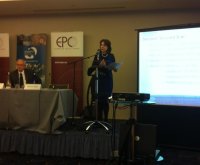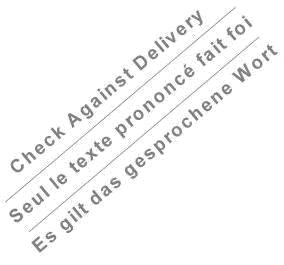The reform of the Common Fisheries Policy

Conference "Fishy business – Time to reform EU fisheries policy?", organised by the European Policy Centre
Brussels, 9 November 2011
Commissioner Maria Damanaki discussed the reform of the Common Fisheries Policy at the conference "Fishy business – Time to reform EU fisheries policy?", in Brussels.

Dear Chairman, ladies and gentlemen,
I would like to thank you for giving me this opportunity to present to you my proposals for reforming the Common Fisheries Policy.
My presentation today will not cover every aspect of this reform. But what I rather want to do is outline how I believe we can achieve environmental sustainability and how this can deliver the social and economic sustainability that everybody is rightfully demanding for the people working in our fishing industry.
Let's start with some facts: there are fewer and fewer fish in the sea. Catches have constantly gone down since the nineties. We have fished too much. We have thrown away fish we don't want to land or for which we don't have quotas. And we have used taxpayer's money to build up our fleet. The result is that today seventy-five percent of our stocks are overfished.
According to our impacts assessment, if we don’t break this vicious circle only 8 fish stocks out of 136 will be sustainable by 2022.
This would be an economic disaster for our fishing industry, particularly small-scale fishermen, who cannot easily move to other waters.
We will loose more jobs in the catching sector, but also in processing, transport and port infrastructure – just imagine the negative effect for the coastal regions.
This will be the reality without a reform and we cannot let this happen.
Let me therefore give you in a nutshell my vision for the future: I want to go for sustainability as a whole. I am talking about environmental sustainability by moving to MSY 2015 and phasing out discards. I am talking about social sustainability, because we can build up healthy fish stocks in our waters and this is the best way to increase our fishermen's income.
I would like to achieve this by modernising the way we take decisions. I am proposing regionalization where the European Parliament and Council take leading decisions on long term plans and framework technical measures with basic rules. Then the fishing industry should work hand in hand with the national administrations and the national parliaments, to set more detailed rules on mesh sizes, area closures etc. The Advisory Councils should also be involved here.
I want to empower the fishing industry so that they can bring their know how and I want to give them the proper support to market their products. You will see this when the Commission adopts the new European Maritime and Fisheries Fund on 30 November. So this is the reform in a nutshell.
Let me now explain more in detail how I want to deliver this sustainability with MSY and the discard ban. These two instruments are an absolute must if we want to be successful.
First MSY: I mentioned that we need to move to MSY 2015. I have on several occasions stressed that we signed up to it in Johannesburg in 2002. But let's leave our international obligation aside for a moment. Some people say it cannot be done. Well let me tell you in different regions of Europe fishermen have already delivered in the direction of MSY. I am talking about Celtic Sea cod and herring, sole in the channel, Northern hake as a few examples. The TAC for Eastern Baltic cod was as low as 38 thousand tonnes in 2008 and for 2012 it will be 68 thousand tonnes, which will bring about an extra 34 million euro for the fishermen.
In these fisheries fishermen have gone through difficult times with reduced quotas. Was it hard for the fishermen? No doubt, yes it was for a while, but the result is clearly worth the temporary sacrifice. Jobs around those stocks now look a lot more secure.
So the fishing industry has shown that working towards MSY can be done. This is the way to increase fishermen's income in a sustainable way. This is the way to keep jobs in the fishing industry and this is the way to keep jobs in the ports and in processing.
This is not wishful thinking, but it is based on our own impact assessment for the CFP reform and it is based on the findings of an internationally renowned study by the World Bank called "The sunken billions".
According to the World Bank we are worldwide loosing 50 billion Dollars with short term fisheries management. Our modelling shows that if we rebuild fish stocks we can generate an extra 2,7 billion Euros for our fishing industry.
This is what I call social sustainability.
Second, the discard ban: We have to stop throwing away fish that is already killed, quota or no quota. Many fishermen across Europe have understood that if we don't take the decision to stop discards, then the consumers will take that decision for us.
This is why I propose to phase out discards in all fisheries in a step by step approach. We will accompany this with better gear selectivity and with proper support for the industry to implement it.
Via regionalization industry, stakeholder and Member States can set all the necessary measures to avoid catching unwanted fish in the first place. With my proposal what is hauled up in the nets has to be landed. If it is undersized fish then it goes into fishmeal production. If it is oversize fish then the fishermen can sell it for human consumption and they will keep the profits from this sale.
With the ban over time we put less pressure on the stocks and the fish will become bigger and fetch better market prices bringing more profits to fishermen.
This will also help us to achieve social sustainability.
Maybe some among you are now thinking: "What are we going to do in the meantime until we reach this social sustainability?"
Let me outline to you how I want to finance the transition. With the two instruments of the Market Organisation and the new Maritime and Fisheries Funds I will support innovation, sustainability and smart growth in coastal areas.
Fishermen should receive storage aid to implement the discard ban. They should also get financial support for participating in trials on more selective gears and for collecting data. I will financially support training and professional qualifications.
I will fund diversification so that small scale fishermen have a second leg to stand on. I will financially support social dialogue meetings for small scale fishermen, so that they can network and exchange best practises. I will also fund marketing initiatives.
I will also fund associations of fishermen to give them a stronger role vis a vis wholesalers and to help them get better prices for their fish. And let me tell you that for all these measures the small scale fishermen will receive a higher co funding. Finally I want to give aquaculture a financial boost for growth in both inland waters and in coastal areas.
This is what I want to do to help fishermen through the transition to social sustainability.
Ladies and gentlemen, I am coming to the end of my intervention and I would like to say a few words about transferable fishing concessions. Three Member States that have introduced transferable concessions have achieved something in four years that the CFP has not achieved in 15 years. They have decreased the fleets by about 30%.
Over the years we have tried to reduce overcapacity, by setting targets and by scrapping fishing vessels with close to 1 billion Euro between 2000 and 2006. And what was the result – an increase of 3% per year in fishing capacity, because while many vessels are scrapped others became more modern.
If I was a school pupil I would say that in a few weeks from now we will get our report card from the Court of Auditors and the grade will not be a good one. They criticise the way we spent taxpayer's money on our fleets as inefficient and not delivering a fleet that is better adapted to our resources.
But I know that some of you are worried about negative developments such as too much concentration and that no safeguards can prevent this. I understand these worries and I am convinced that we need to be very careful here. My team is therefore looking into this issue in detail now. But what is crystal clear ladies and gentlemen is that we cannot continue with scrapping fishing vessels via EU funds, because it is too expensive and it has not delivered.
Ladies and gentlemen,
I have not spoken in detail about aquaculture or the external dimension of fisheries policy. This does not mean that they are not vital in this reform, to the contrary. I am happy to answer any questions you may have on these issues in our discussion today.
Thank you.


